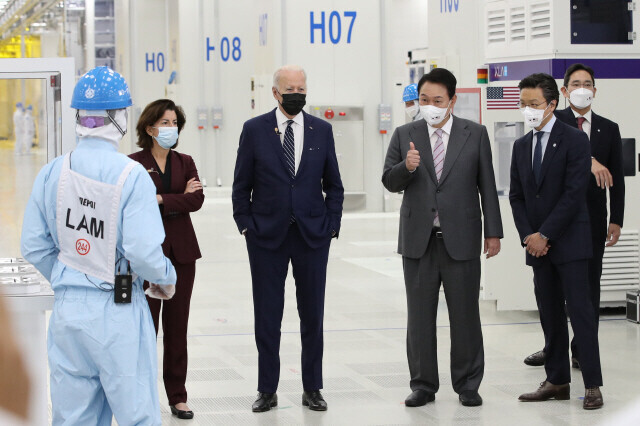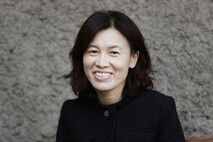hankyoreh
Links to other country sites 다른 나라 사이트 링크
[Column] Fatal flaws of Yoon’s pro-America foreign policy are beginning to show


Jake Sullivan, the US national security advisor, was in charge of foreign policy for the presidential campaign of Hillary Clinton in 2016. Following Clinton’s shocking loss to Donald Trump, Sullivan took a deep dive into the relationship between US foreign policy and the middle class. The result of his research was an 82-page report titled “Making US Foreign Policy Work Better for the Middle Class,” which he composed along with foreign policy and national security experts from the Democratic Party.
The phrase that appears most frequently in that report is the American “middle class.” Sullivan argues that the US middle class — which has been battered by pricy military adventures overseas and globalization that depended on Chinese manufacturing — must be revived if the US is to maintain its hegemony over the world. He calls for sharpening the US’ competitive edge in high-tech industries, aggressive government promotion of foreign investment in the US, and the use of diplomatic influence to make new rules to govern global supply chains for the advantage of the US.
Those policies represent a vision of “America First” that’s much more sophisticated than Trump’s. It can even be regarded as an American version of “Made in China 2025,” taking a page from the state-led development strategy of countries like China that the US has oft criticized. The “selfish policies” the US is currently implementing through the CHIPS and Science Act and the Inflation Reduction Act have deep roots.
It wasn’t until Korean-made electric vehicles were made ineligible for tax credits because they fail to meet the requirement for final assembly in North America in the Inflation Reduction Act, which passed Congress last month, that the Korean government hurriedly launched a belated diplomatic campaign. A joint government delegation rushed to the US, and Kim Sung-han, director of Korea’s National Security Office, asked Sullivan to resolve the issue, but that only shows how impractical it is to alter a law that has already taken effect.
Just three months ago, Yoon patted himself on the back for upgrading the Korea-US relationship into an “economic and national security alliance” following a summit with Biden 10 days after his inauguration, but it has already become clear that there’s little substance behind the fine-sounding slogans of his foreign policy.
For one thing, Yoon was remiss in the elementary diplomatic imperative of figuring out what’s happening in Congress before taking action. The excuse offered by government officials was that the Inflation Reduction Act’s lightning-fast passage through Congress gave them no time to respond.
It’s true that the bill, after remaining stalled for a year, was hustled through Congress at the end of July, with an eye on the midterms in November.
But during that time, American automakers such as Tesla and General Motors, Japanese companies like Toyota, and other countries including Canada and Mexico managed to figure out what was happening in Congress and achieve their goals through aggressive lobbying. The Yoon administration doesn’t have an answer for why Korea is the only party left out of the bargaining.
“GM and other American automakers brought about last-minute changes in the law by strongly lobbying senators and congresspeople about the need to create more jobs in the Rust Belt. While matters concerning foreign policy, national security and commerce are decided in Congress, the Korean Embassy to the US and the Ministry of Foreign Affairs weren’t able to either follow trends in Congress or make a difference there,” said an expert in Washington who is familiar with the situation in Congress.
Another fatal flaw of the Yoon administration’s pro-US foreign policy is its failure to adequately read and respond to changes in US policy. The US’ discrimination against Korean electric vehicles is ultimately similar to China’s exclusion of vehicles equipped with Korean-made batteries from subsidies as retribution for Korea allowing the US to deploy the THAAD missile defense system in the country in 2016. Both the US and China give top priority to the prerogatives of national security and industrial competitiveness.
Like China, the US is moving ahead with state-led investment and R&D in areas of competition with China, including semiconductors, energy, biotech and aerospace, and accelerating a strategy of luring factories in key areas to the US. Despite that reality, the Korean government was absorbed in a fantasy about “goodwill among allies.”
“Given current trends, Korean companies will hurry to move factories to the US to match the US’ new standards, and unemployment and an erosion of industry will grow more severe in Korea as a whole. While semiconductors and other high-tech industries are one reason the US places a premium on Korea’s national security, moving those industries to the US could increase Korea’s security concerns. That’s one of the various factors that need to be considered as we craft a sophisticated strategy,” said Lee Hyeon-tae, a professor of Chinese language and literature at Incheon National University.
While the needs of the market and cutting-edge technology may mandate cooperation with the US, Korea needs to enter into strategic negotiations with the US while clearly stating the principles on which it won’t bend in consideration of Korean workers and industrial competitiveness. Korea also needs to have the courage to firmly demand that the US be a responsible ally in concert with other countries that are dealing with similar concerns.
But the Yoon administration seems to be too busy bashing the previous administration for its “pro-Chinese foreign policy” to contemplate those concerns or devise such a strategy.
Please direct questions or comments to [english@hani.co.kr]

Editorial・opinion
![[Column] Life on our Trisolaris [Column] Life on our Trisolaris](https://flexible.img.hani.co.kr/flexible/normal/500/300/imgdb/original/2024/0505/4817148682278544.jpg) [Column] Life on our Trisolaris
[Column] Life on our Trisolaris![[Editorial] Penalties for airing allegations against Korea’s first lady endanger free press [Editorial] Penalties for airing allegations against Korea’s first lady endanger free press](https://flexible.img.hani.co.kr/flexible/normal/500/300/imgdb/original/2024/0502/1817146398095106.jpg) [Editorial] Penalties for airing allegations against Korea’s first lady endanger free press
[Editorial] Penalties for airing allegations against Korea’s first lady endanger free press- [Editorial] Yoon must halt procurement of SM-3 interceptor missiles
- [Guest essay] Maybe Korea’s rapid population decline is an opportunity, not a crisis
- [Column] Can Yoon steer diplomacy with Russia, China back on track?
- [Column] Season 2 of special prosecutor probe may be coming to Korea soon
- [Column] Park Geun-hye déjà vu in Yoon Suk-yeol
- [Editorial] New weight of N. Korea’s nuclear threats makes dialogue all the more urgent
- [Guest essay] The real reason Korea’s new right wants to dub Rhee a founding father
- [Column] ‘Choson’: Is it time we start referring to N. Korea in its own terms?
Most viewed articles
- 1New sex-ed guidelines forbid teaching about homosexuality
- 260% of young Koreans see no need to have kids after marriage
- 3[Column] Life on our Trisolaris
- 4Months and months of overdue wages are pushing migrant workers in Korea into debt
- 5Presidential office warns of veto in response to opposition passing special counsel probe act
- 6S. Korea discusses participation in defense development with AUKUS alliance
- 7OECD upgrades Korea’s growth forecast from 2.2% to 2.6%
- 8Hybe-Ador dispute shines light on pervasive issues behind K-pop’s tidy facade
- 9Opposition calling for thorough investigation into Pres. Park’s unelected power broker
- 10Ruling and opposition parties agree to special prosecutor for Pres. Park/Choi Sun-sil scandal